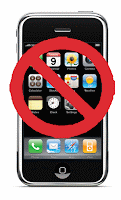
By: Techtree News Staff, Aug 9, 2008
Everybody loves the iPhone. Even though few in India have seen, touched, or used the device, the buzz for the product is palpable; its praise almost universal. While we agree that the iPhone is a great device that gets a lot right, there are several faults that need to be highlighted. The most glaring of these faults have come crawling out of the woodwork in the past few weeks.
The biggest issue here is that Apple has created what some like to call a "walled garden" through its App Store business. Instead of a thriving software ecosystem, Apple wants a developer to pay $99 before starting development; to only sell software through Apple's store, and to comply to restrictions placed. The reasons for doing so might be noble: greater security, and greater stability could only have been assured by a closed environment, as Apple likes to point out. But is that really so? Does Apple guarantee a secure and crash-proof product now that both consumers and developers live in this gilded cage?
The decision to create this walled garden has also seen useful applications removed from the store, or useless applications being added to the store, and then removed. Yesterday, we learned that Apple might be tracking everything installed on the iPhone, with speculation that this hidden mechanism might even allow them to remotely disable an application.
If all of this doesn't give you cause for a pause, here's everything else that's wrong with the iPhone and the Apple way of things:
1. You can only sync music and video through iTunes. Want to drag-and-drop content from your hard-drive? Would like to sync music from another store -- from Amazon, for example? You are out of luck.
2. You can only install apps through iTunes. Never before has a cellphone maker slammed the door to an open development enviornment and received nothing but praise for doing so. Imagine Microsoft creating a gated software ecosystem and installing themselves as the gatekeeper. They would be eaten alive by the press. Apple gets a free pass.
3. Apple deletes useful applications. Nullriver's modem app went to the grave with no reason stated. Apple's digital business is dependent on the music and movie industry's whims. How long before the industry dictates which applications we can run?
4. Apple might not accept apps which might be detrimental to its own business. We won't hold our breath for competitive products to appear on the iPhone anytime soon.
5. You can only run one third-party application at a time. An instant messenger that runs in the background and collects messages while you are away? Not happening.
6. Apple might not allow app vendors to open up their apps. The terms of the NDA that potential application developers for the iPhone need to sign, effectively restrict redistribution of the source. Apple has created OSX on the back of FreeBSD; Safari on KHTML, SproutCore library used in MobileMe, and now they have built a layer on top that excludes others. Nik at TechCrunchIT laments that "the same community who demand all from Microsoft, feel gifted and special when Apple give them an inch of rope... Applications can only be installed from a single source, iTunes, and open source applications and distribution is near impossible. How do you install an iPhone application without iTunes? Where are the community advocates arguing for a standard interface, openess and free code?"
7. Limited Bluetooth use. The iPhone 3G has Bluetooth 2.0 with EDR but can you transfer files over Bluetooth? Does it support A2DP? Stereo Bluetooth? No on all counts. As of now, all you get from Bluetooth are headset voice calls, and that's it.
8. No copy-paste. This might be more of an interface issue that Apple is seeking to solve, than anything else. But it only underlines the drawbacks of a walled garden. If development was as open as say, it is on the Palm platform -- you would have a hundred different solutions by now, and at least one you could actually use. This also underlines how much the innovative spirit is killed by a controlled development environment. The iPhone ecosystem doesn't encourage software tinkering and probably won't spur garage breakthroughs that drive the industry forward.
9. No MMS. While you can e-mail photos, multimedia messaging is absent from the device. And speaking of videos...
10. No video recording. In the world of YouTube, the iPhone 3G does not offer video recording.
11. No voice command. For a touch-screen-only phone, voice controls would have been a huge plus for hands-free or one-handed control. Can we expect this functionality to be added by a third-party app?
12. Hardware locked to carriers. You cannot use any SIM card with this GSM device. How stupid is that? Hello monopolies, goodbye competition. Thanks to carrier lock-in when the phone launches in India, the iPhone 3G might not even enjoy 3G until months afterwards. How do you like them apples?
The iPhone 3G is a great device. Apple has innovated with its interface; it's great at what it does. The problem is that its benefits and innovations only highlight Apple's missteps. Dave Winer posits that it is a lack of choice that makes Apple products an attractive proposition: "All the other products suck. Hugely. Apple's [products] just suck a bit less. Not a huge accomplishment for an industry, imho."
The Apple iPhone 3G might be a great product. But that does not account for the universal praise that it earns all over the net, from press and fans alike. If we do not underline its drawbacks, the status quo will be maintained. So grow a little hate inside your hearts for the iPhone. Apple can do wrong.
Link source: http://www.techtree.com/India/News/10_Reasons_Why_You_Should_Hate_the_iPhone/551-92001-615.html
Comments